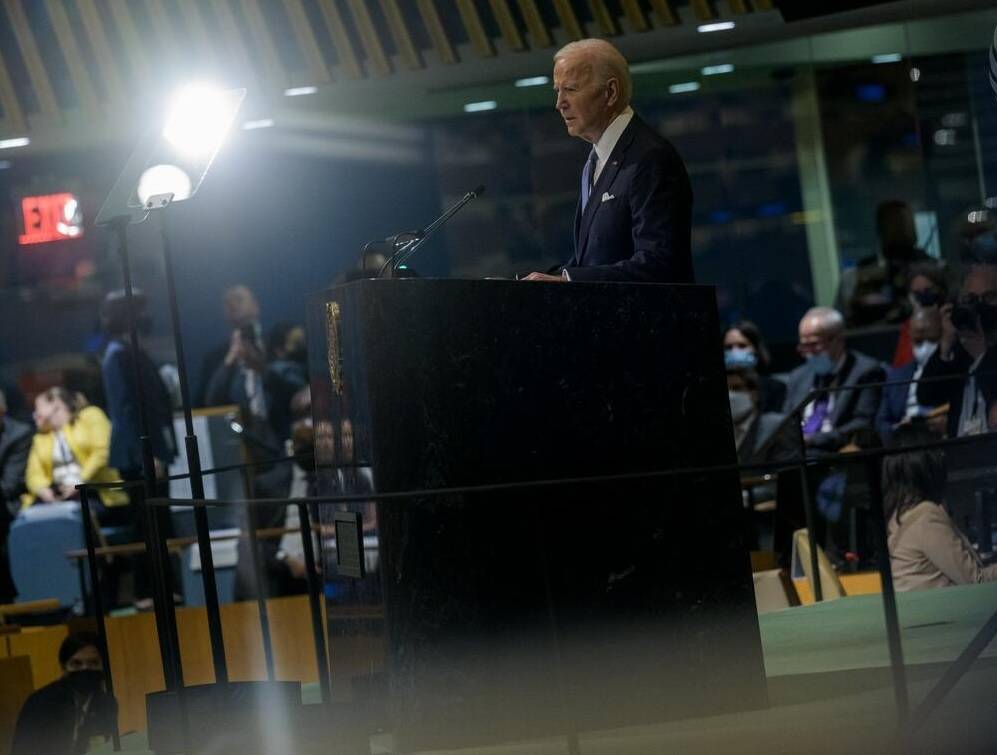Washington has long expressed backing for India’s quest for a permanent seat through different administrations….reports Arul Louis
President Joe Biden on Wednesday reiterated the US’ commitment to India getting a permanent seat on the Security Council to ensure it remains credible.
Addressing the high-level meeting of the General Assembly, he said: “The United States supports increasing the number of both permanent and non-permanent representatives on the Council. This includes permanent seats for those nations we have long supported.”
“The United States is committed to this vital work,” he declared.
Washington has long expressed backing for India’s quest for a permanent seat through different administrations.
It also backs permanent seats for Japan and Germany.
“I also believe the time has come for this institution to become more inclusive, so they can better respond to the needs of today’s world,” Biden said.
He said that the US backs “permanent seats for countries in Africa, Latin America and the Caribbean.
In order “to ensure the council remains credible and effective”, he said, the US also supports increasing the number of both permanent and non-permanent representatives of the Council”.
No clear front-runners have emerged from Africa, Latin America and the Caribbean for permanent seats, although Brazil, the largest country in South America, has staked its claim.
Of regional priorities, Biden spoke of the role of the Quad, made up of India, the US, Japan and Australia.
“In every region, we pursued new constructive ways to work with partners to advance shared interests”, he said and mentioned “elevating the Quad and Indo-Pacific.”
Biden bats for UNSC reforms
Earlier on Wednesday, President Joe Biden in his address at the UN General Assembly reiterated his commitment to reforming the UN Security Council.
Biden said he believes the time has come for the institution to become more inclusive so that it can better respond to the needs of today’s world.
Members of the UN Security Council, including the United States, should consistently uphold and defend the United Nations Charter and refrain from the use of veto, except in rare and extraordinary situations, to ensure that the Council remains credible and effective, he said.
“That is also why the United States supports increasing the number of both permanent and non-permanent representatives of the Council. This includes permanent seats for those nations we’ve long supported,” Biden said.
Big boost for India
President Biden’s support provides a big boost to New Delhi’s push for the reform of the powerful UN organ as India has been at the forefront of efforts at the United Nations to push for an urgent long-pending reform of the Security Council, emphasising that it rightly deserves a place at the UN high table as a permanent member.
India in June last year had asserted that the Inter-Governmental Negotiations (IGN) on UN Security Council reforms can no longer be used as a smokescreen, as the General Assembly decided to roll over the IGN work to the next UNGA session and agreed to include an amendment proposed by the G4 nations of Brazil, Germany, India and Japan.
At present, the UNSC comprises five permanent members and 10 non-permanent member countries which are elected for a two-year term by the General Assembly of the United Nations.
The five permanent members are Russia, the UK, China, France and the United States and these countries can veto any substantive resolution. There has been growing demand to increase the number of permanent members to reflect the contemporary global reality.
Push for entry to NSG
During the first in-person meeting with Modi in September last year, President Biden had reaffirmed US support for India’s entry to the Nuclear Suppliers Group (NSG). The NSG is a 48-member grouping which regulates global nuclear commerce.
Ever since India applied for the membership of the NSG in May 2016, China has been insisting that only those countries which have signed the Non-Proliferation Treaty (NPT) should be allowed to enter the organisation.
India and Pakistan are not signatories of the NPT. After India’s application, Pakistan too has applied for the NSG membership in 2016.
China maintains that there would be no discussion on India’s entry into the NSG before reaching a specific plan on non-NPT members’ participation in the elite grouping, as it declined to give a timeline to reach a consensus among member states on this issue.

Leave a Reply